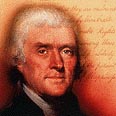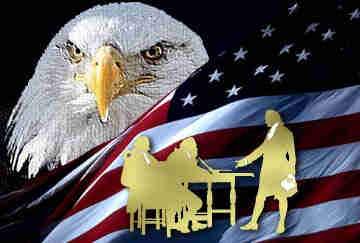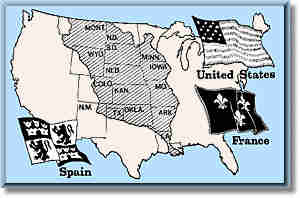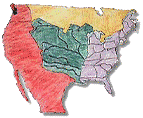Thos. Jefferson

We'll do a brief time line of Jefferson's political career, and then go back and delve a little deeper into the most important aspects of it.

Having attended the College of William and Mary, Jefferson practiced law and served in local government as magistrate, country lieutenant and member of the House of Burgesses in his early professional life.

At the age of 33, while a member of the Continental Congress, he was chosen in 1776 to draft the Declaration of Independence.

After Jefferson left Congress in 1776, he returned to Virginia and served in the legislature. He served as Governor of Virginia from 1779 to 1781.

In 1790, he accepted the post of Secretary of State under his friend, George Washington. His tenure was marked by his opposition to the pro-British policies of Alexander Hamilton.

In 1796, as the presidential candidate of the Republicans, he became Vice-President after losing to John Adams by three electoral votes. Four years later, he defeated Adams and became President.

Perhaps the most notable achievements of his first term were the purchase of the Louisiana Territory in 1803 and his support of the Lewis and Clark Expedition.

Jefferson was succeeded as President in 1809 by his friend, James Madison, and spent the last 17 years of his life at Monticello. He wasn't idle, as the idea for the University of Virginia was already brewing in his head. OK, let's take a closer look at some of his best-known accomplishments.

Of all Jefferson's accomplishments, he is probably best remembered as being the author of our Declaration of Independence. It has been regarded ever since as a charter of American and universal liberties. It all began in 1776, when a red-headed Thomas Jefferson took quill pen in hand and wrote the words that were the beginning of the greatest nation on earth - The United States of America. He began...
The Declaration of Independence of the Thirteen Colonies In CONGRESS, July 4, 1776 The unanimous Declaration of the thirteen United States of America, When in the Course of human events, it becomes necessary for one people to dissolve the political bands which have connected them with another, and to assume among the powers of the earth, the separate and equal station to which the Laws of Nature and of Nature's God entitle them, a decent respect to the opinions of mankind requires that they should declare the causes which impel them to the separation.

We hold these truths to be self-evident, that all men are created equal, that they are endowed by their Creator with certain inalienable Rights, that among these are Life, Liberty, and the pursuit of Happiness. That to secure these rights, Governments are instituted among Men, deriving their just powers from the consent of the governed. That whenever any Form of Government becomes destructive of these ends, it is the Right of the People to alter or to abolish it, and to institute new Government, laying its foundation on such principles and organizing its powers in such form, as to them shall seem most likely to effect their Safety and Happiness...
We've often wondered how many American citizens, living in this great country and enjoying its freedoms, have ever taken the time to read these words. We also wonder how many of our elected government officials have read it - ever. These are the words that began it all.

THE LOUISIANA PURCHASE
The United States bought the Louisiana Territory from France in 1803. Napoleon sold it to the United States after Spain had ceded it to France in 1800. An interesting fact about the trading of this land is that the Louisiana Territory originally belonged to France!
In 1682, The explorer La Salle had claimed the region drained by the Mississippi River in the name of King Louis XIV. France kept the land until 1762, when they gave it to Spain to help pay for a war debt. When King Charles IV, of Spain gave the Louisiana Territory to France in 1800, there was an agreement that France would never sell the land to a third party. Well, this didn't last long, because on April 30, 1803, a treaty was begun that would transfer the land to the United States.

When President Jefferson was informed that Spain had signed a secret treaty with France to give the Louisiana Territory back to France, he sent James Monroe and Robert Livingston to Paris with 2 million dollars to purchase the port city of New Orleans. They were surprised when Napoleon told them that he would sell them the entire territory for 15 million dollars.

Because there weren't any Fax machines or even telephones, these gentlemen had to make a deal with the French government without even talking to President Jefferson about it. But when they got back and told him, he was happy about the whole thing. On April 30, 1803, they began to write a treaty for the deal. This land deal doubled the size of the United States and cost the government less than 3 cents an acre.

What states were 'carved' from this large piece of land?
All of Louisiana, Arkansas, Missouri, Nebraska, South Dakota, North Dakota, and Iowa were in the territory. Parts of Montana, Colorado, Wyoming, Oklahoma, Mississippi Alabama, Kansas, and Minnesota were in the land purchased at such a reasonable price.

LEWIS AND CLARK
EXPEDITION
It is 1804. U.S. President Thomas Jefferson has asked Meriwether Lewis to lead an expedition across western North America—unknown territory for all but Indians. The goals: map the rivers, make friends with natives, open the West to trade, and look for a Northwest Passage (an easy water route from coast to coast). Lewis and his colleague William Clark have chosen a special team for the journey.

The Lewis and Clark Expedition stands as United States' Odyssey. The great adventure speaks to Americans of all kinds, perhaps because among the Corps of Discovery there was a woman, a black man, and those of French, Irish and English descent. The remarkable journey required discipline and sacrifice, strength and ingenuity. The expedition traveled the pulsing arteries of the continent, the Missouri and Columbia rivers, and it crossed the nation's backbone, the Rocky Mountains. The epic was recorded in ordinary language, made extraordinary by the experience of its authors.

Let's move on the last page of our tribute to Thomas Jefferson. We'll be exploring his last and one of his proudest accomplishments.